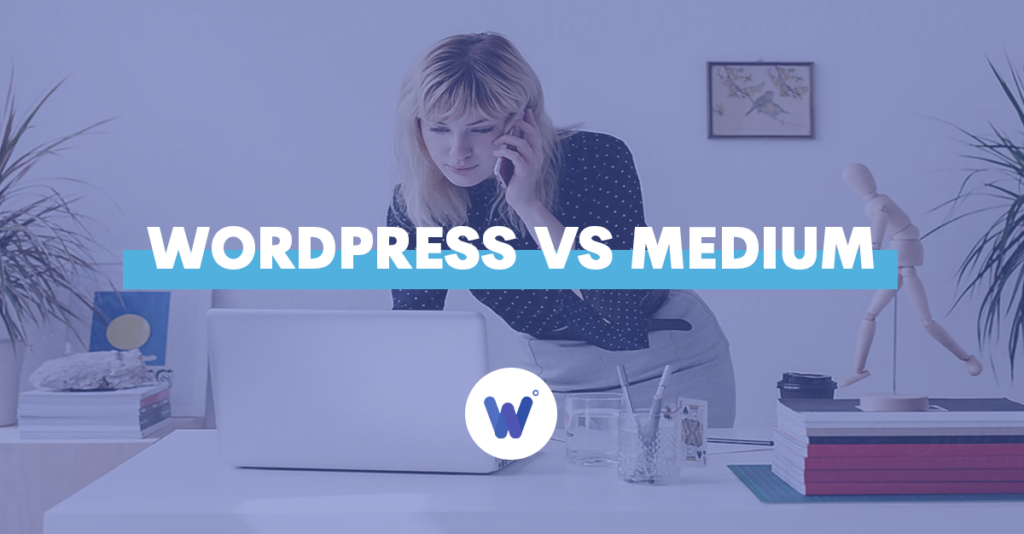
If you are reading this article, you are likely struggling to compare content publishing platforms. There are plenty of options out there and plenty of things to consider.
You’ve heard about WordPress and Medium, but which one is right for you? These two platforms are very different, so let’s distinguish between them.
In this article, we will review both platforms, their pricing, features, target market, and core differences.
Effortlessly export your Google Docs to WordPress with just 1-click.
Get Started TodayBefore we provide an in-depth analysis, let’s have a quick look at the offers and pricing of WordPress and Medium.
WordPress is an advanced Content Management System (CMC) and a hosting provider. It is widely used by businesses of various ranks due to the platform’s endless possibilities.
WordPress is free to get started. To unlock more features, you will have to choose among four website options – Personal, Premium, Business, or eCommerce.
The Personal plan costs only $4 monthly, while the eCommerce plan amounts to $45 monthly. WordPress hosting price starts at $23.33 monthly and could exceed $271 monthly, depending on the features. You don’t necessarily have to use WordPress hosting, though – any other hosting provider will do the job.

Medium is an open-content publishing platform. This means anyone can write and read blogs on it. What separates Medium from most social media is that the platform also curates and promotes posts.
Blogging on Medium is free. Even better – you can monetize publishing content on the platform. The company makes a profit from readers, rather than bloggers.
Most content creators don’t want to spend time learning to code or installing tools and plugins.
Why focus on trying to make things work together when you can focus on the content? This variable is less important for tech geeks or those who can afford to pay a developer.
It is possible to figure out WordPress even if you don’t code. However, some HTML or CSS knowledge would be an advantage, as WordPress is famous for various plugins and often integrating them into your website can be intricate.
However, there are many CSS generators you can utilize as a beginner, too.

Medium is designed specifically for blogging and is free from complex features. Its interface is minimalistic and convenient.
Content editing is not much different from that in MS Word or WordPress. The main plus is that you don’t have to do any backend work or optimize the search engine – all you have to do is register on the website and start writing. As simple as that.
Feature variety is often closely linked to ease of use. Of course, a wide possibility range is impressive, but it is important to consider potential complications.
If you are a content creator, you likely won’t use a big part of WordPress features. Medium-sized and large businesses, on the other hand, often require in-depth analytics of every action on the website.
You can create any type of website using WordPress, including online stores, job boards, portfolio websites, and blogs. Content editing options are endless.
The same goes for themes and plugins. WordPress features include eCommerce support, Google analytics integration, live chat support, automated site backups, and many more.
Medium is only suitable for blogging and has limited content editing options. It can’t get any simpler – you can format your text, insert images, videos and URLs, and that’s it. However, insights are available to those who want to measure reader feedback. Stats include views, reads, read ratio, and recommends.
Both platforms allow you to make a profit. If you sell goods online, the choice is obvious. But for content creators, it isn’t as clear. Medium helps expand your audience on their own, whereas making a profit from a blog on WordPress requires more effort.
However, you can make more from selling ads than from Medium Partnership Program. One thing to consider is whether you want the blog to be your only income, or whether you want it to generate a bit of additional profit with no extra effort.
WordPress is a perfect choice for an online store. eCommerce tools for WordPress are designed to provide you with the necessary information to help maximize profit and expand your business. However, it won’t help you to grow your audience and paid subscriptions are only available with the use of plugins. Another option to monetize your blog is selling ads.

If you allow Medium to curate your content, you can access the Partner Program and start making money. The platform promotes your blog, and all you have to do is write. You are unlikely to get crazy rich, but the good thing is, you don’t have to worry about advertisement contracts or installing extra software.
The answer for small blogs is certain – Medium. It has a user-friendly interface and is free from complications. The platform will help you to grow the audience and provide just as much analytics as you need. Last but not least, it’s free!
If you own a business, Medium is not an option. It does not support eCommerce and was developed for content creators.
If you own a blog with thousands or millions of views, WordPress may be a better choice. It has more content editing and profit-earning options. If you are willing to spend some time and money, WordPress is worth it. However, Medium is a great alternative if you aren’t too tech-savvy and don’t have time or the inclination to promote your blog.
WordPress and Medium are two completely different platforms designed for people with diverse needs, skills, and goals. WordPress wins in terms of feature variety.
But for anyone who wants to focus on the content and leave the promotion, analysis, and hosting solutions to the platform, Medium is the right way to go.
Even if you already have a website on WordPress, consider joining Medium – it won’t cost you a dime but will enlarge your audience and profit.